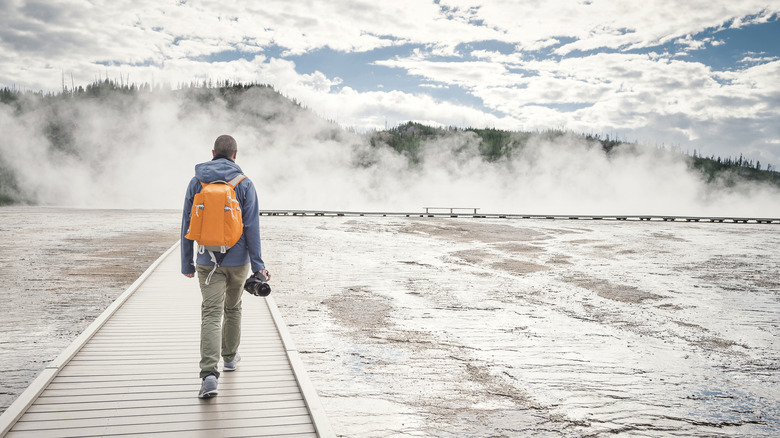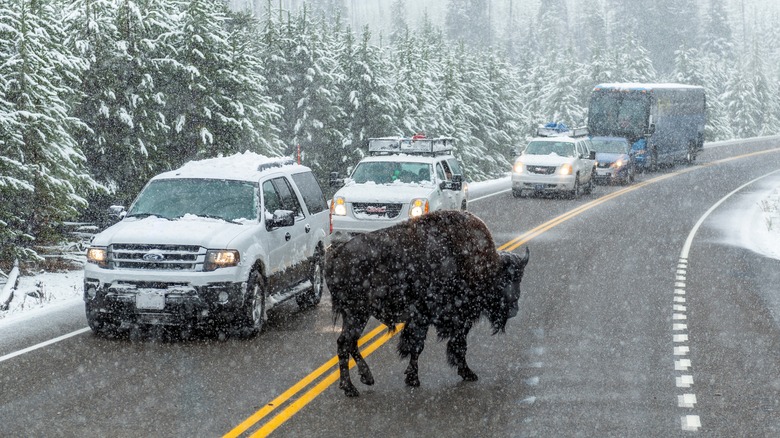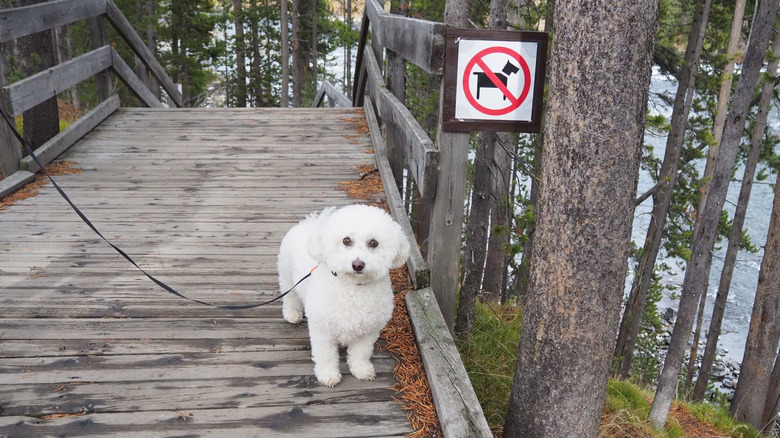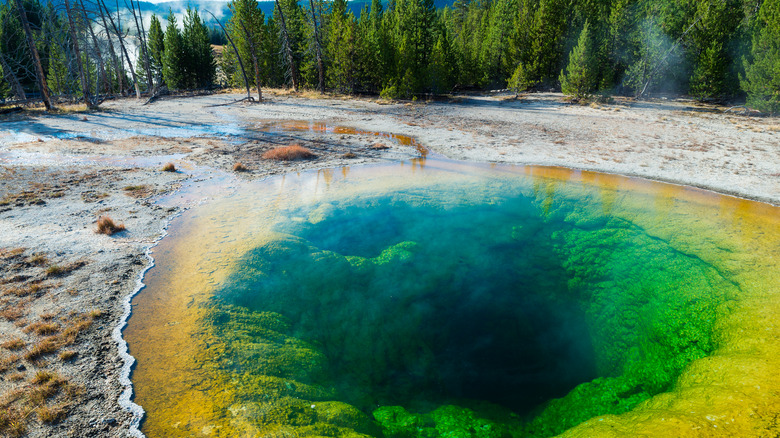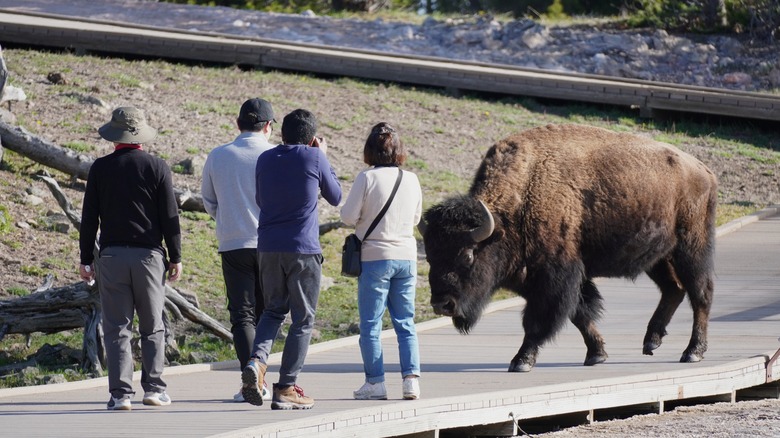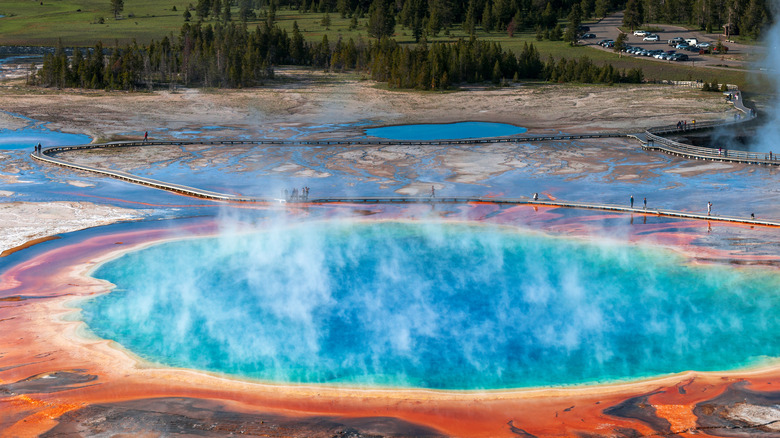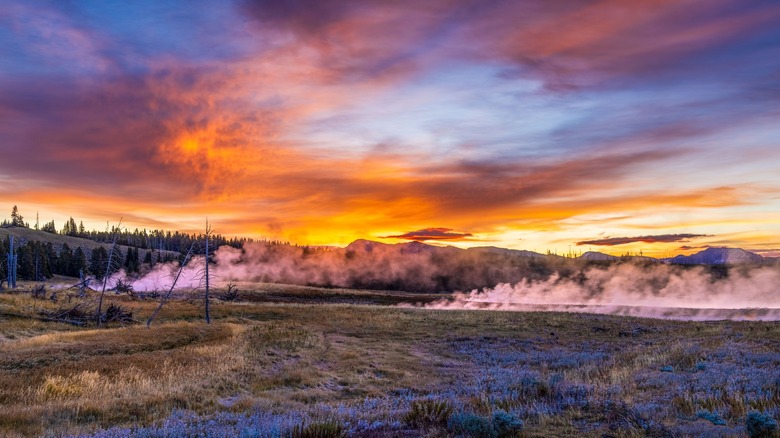The Most Upsetting Tourist Mistakes People Make In Yellowstone National Park
With its bountiful wildlife, incredible landscapes, and vibrant geothermal features, it's easy to understand why the iconic Yellowstone National Park is among the most popular national parks in the United States. Unfortunately, the crowds of visitors who flock to Yellowstone every year have a reputation for making reckless decisions while in the park, sometimes with devastating consequences for the park's beloved landmarks, the animals that live there, and the tourists themselves. Some of the most egregious of these mistakes include driving recklessly on park roads, bringing pets into unauthorized areas, littering, getting too close to wild animals, and not being cautious around the park's boiling hot springs.
While Yellowstone can be a once-in-a-lifetime destination, it's important to not forget that what makes this place beautiful can also be what makes it dangerous. While Yellowstone may not be one of the most dangerous or deadliest parks in the world, it's vital to proceed with caution. It is a privilege to be able to see these incredible wild places and creatures, so it's important to take care so you can keep them and your loved ones safe during your visit.
Driving dangerously on park roads
The leading cause of death for people visiting Yellowstone isn't being mauled by grizzly bears or slipping while rock climbing. It's car crashes. You essentially have to be in a vehicle to explore Yellowstone. While you can book a bus tour, the most common way to get around is by driving yourself. This can be an incredible experience; in fact, the road nicknamed "the most beautiful roadway in America" takes you right into Yellowstone National Park. However, the narrow, winding roads can be tricky for those who aren't used to it. Even if you're completely comfortable with the terrain and there's not another pair of headlights in sight, however, you need to proceed with caution. No matter how quiet and remote a road seems to be, you should never speed through the park.
In addition to risks to and from other cars, the animals who call this park home wander across the road often. It's vital that you drive at a reasonable pace and keep your eyes open, for their safety and your own. Although this is a place where animals are supposed to be safe, animals including bison and bears are often killed in car accidents in and around Yellowstone. To avoid tragic incidents like these, the West Yellowstone Police Department has advised not only driving the speed limit, but being aware of weather and road conditions, and prudently slowing down even more when it's necessary.
Bringing a pet everywhere in the park
National Parks can be great places to bond with your dog and help them get some exercise in the great outdoors. In fact, the National Park Service even has the Bark Rangers program, which encourages pet owners to pledge to be responsible with their dog while visiting parks. However, Yellowstone National Park is not the most dog friendly option. For one thing, dogs have to remain close to developed areas like campgrounds or inside your car, so you won't be able to hit the trails if you brought your furry best friend with you. Bringing a pet isn't just a mistake because it holds you back from enjoying your trip to the fullest. It can be extremely dangerous for them.
Yellowstone has multiple large predators like bears, coyotes, and wolves, which may react strongly to dogs. The geothermal waters which have contributed to Yellowstone's fame are even more potentially deadly. Dogs may not understand that thermal springs and pools are different from regular water, and leap in. Tragically, these waters are hot enough to severely burn and even kill, and dogs have died this way before. Humans have also been horrifically burned and killed attempting to rescue their beloved dogs from the water.
Throwing things into Morning Glory
The National Park Service encourages its visitors to follow the seven leave no trace principles when visiting parks like Yellowstone. One of the most important principles is to dispose of waste properly. Most people know you shouldn't leave your trash in parks, but unbelievably, it seems that many tourists have been littering directly into one of Yellowstone's most famous landmarks, Morning Glory. Unfortunately, it would appear that years of irresponsible visitors have done lasting damage.
The thermal pool known as Morning Glory is famous for its vibrant color, but unfortunately, that color has been dulled by years of people tossing things into it. In the tradition of wishing wells, it seems that a lot of tourists felt compelled to throw coins into the water of this pool. In an interview with Cowboy State Daily, former Yellowstone National Park ranger Jeff Henry stated that when he took part in a cleanup of the Morning Glory Pool in 1991, he and the other rangers found thousands of coins inside, along with other random trash and rocks.
Getting too close to the animals
One of the most thrilling parts about a visit to Yellowstone National Park is the opportunity to see herds of bison grazing by the early light of dawn or hear the bugling of elk or the howling of wolves in the night. However, approaching wild animals, whether because you want a closer look or because you want to take a dangerous selfie with wildlife, is a very bad idea. Yellowstone National Park has specifically asked visitors not to get too close to animals, especially bison, which have injured many visitors to the park.
The park warns that you should be 25 yards away from any animal in the park at all times, and give bears and wolves an extra 75 yards on top of that. Despite these warnings, tourists have been spotted getting extremely close to bison, sometimes for pictures. Ignoring the park's rules about getting close to the animals can lead to painful, even deadly incidents for both you and the wildlife around you.
Not being cautious around geothermal pools
Colorful geothermal pools are some of the biggest attractions at Yellowstone, but they can also be extremely dangerous. It's not always obvious where the danger is, so to stay safe in areas with hot springs, it's important to stay on the boardwalks, and keep children close to you at all times. According to a Yellowstone spokesperson speaking to KTVQ (via Yellowstone Insider): "Directly below the surface and in areas where there are thermal features, there can be a lip over the top of the feature that hides boiling hot water below."
Over the years, numerous people have been horrifically burned or killed in the pools and springs.Some have intentionally gone into the water, mistakenly believing that it would be a relaxing hot spring soak, and not realizing that the water can be literally boiling. Others have slipped and fallen into the water. The water is often so hot that it's not possible to recover the remains of those who die in them, and there may not be any remains left to recover at all.
Our methodology
There are plenty of mistakes that tourists can make in a National Park, from not locking bear resistant containers properly and stacking stones to make cairns to accidentally creating new trails by having all of your hiking buddies walk in each other's footsteps and damaging the plant life. For this list, however, we reviewed news stories detailing mistakes that visitors to Yellowstone specifically made, and narrowing our list to those with particularly tragic consequences, either for humans, animals, or park features.
We prioritized those mistakes which many tourists have made over the years, in the hopes that our readers will be able to avoid them on their own trips to Yellowstone National Park.
